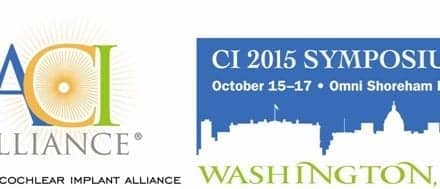Some of the latest hearing industry news from HearingReview.com.
- Westone Receives Private Equity Investment for Expansion and Acquisitions
- Marine Corps Now Requires Yearly Hearing Test for All Service Members
- First FDA-Approved Study of Stem Cells to Treat Hearing Loss
- Tennessee Enacts $1,000 Hearing Aid Insurance Coverage Mandate for Children
WESTONE RECEIVES PRIVATE EQUITY INVESTMENT FOR EXPANSION AND ACQUISITIONS

Westone Laboratories Inc has announced that it has entered into a partnership with private equity firm CID Capital. The investment allows for Westone’s expansion, while also allowing the Morgan family, Westone’s founders, to pursue personal interests.
Westone was founded in 1959 and has grown to become a leading designer, manufacturer, and distributor of custom earpieces for hearing aids, custom hearing protection products, in-ear musicians’ monitors, premium earphones for personal listening, and specialty communication products for military and law enforcement agencies.
In addition to its recent press release announcing the new partnership, the company wrote a more personal message to its customers on its blog. Although unsigned, it is apparently from Westone’s CEO, Lynn Kehler, who writes:”As most of you are aware, the Morgan family founded Westone in 1959 and has contributed enormously to our growth and success over the last 52 years. Over the last couple of years, I have been working closely with the family to explore retirement options that will allow Westone to carry on and grow. We have spent a lot of time on this process to ensure that the option chosen will allow Westone to continue as a leader in the hearing healthcare industry and provide the quality products and service that you have come to expect from Westone.
“I am excited to announce that Westone has a new partner, CID Capital! CID is a private investment group based in Indianapolis, Indiana. We are excited about this new relationship, as this will allow the existing Westone management team to continue to operate and build the business, while allowing members of the Morgan family to spend more time pursuing personal interests. We plan to continue to strengthen our hearing healthcare business, while also focusing on hearing conservation and custom hearing protection for recreation and industry. As you are aware, these have traditionally been Westone’s core businesses, and they will continue as a strategic focus moving forward.”
The rest of the message goes on to describe CID Capital and its history of investing in companies like Westone.
MARINE CORPS NOW REQUIRES YEARLY HEARING TEST FOR ALL SERVICE MEMBERS

According to an article published in the Marine Times, all active duty Marines will now be required to have annual hearing tests. The mandate includes noncombat troops who may also be exposed to loud noises.
The article cites the Marine administrative message (MARADMIN) of January 12, 2012, which states that Marines who have not had a hearing test in the past year must get one before May 5, 2012. The message further states that the goal of the new policy is “100% hearing readiness.”
Additionally, active-duty units are required to have a “hearing-readiness training standdown” within 4 months of the MARADMIN message date; reserve units will have 6 months.
A “standdown” is the military’s term for a temporary stop of offensive military action. Therefore, all members will be required to take time off from their normal active duties in order to participate in a course on hearing conservation.
Marines who work in noisy environments such as aviation, artillery, infantry, and armor have always been required to have hearing screening tests, but even service members working in noncombat environments, such as kitchens, are subject to high levels of noise from industrial-sized blenders, dish washing machines, and other industrial food preparation machines.
The MARADMIN also requires units to conduct baseline inventories of noise levels and mitigation measures, including proper fittings of ear protection for Marines.
FIRST FDA-APPROVED STUDY OF STEM CELLS TO TREAT HEARING LOSS
Children’s Memorial Hermann Hospital, Houston, and Cord Blood Registry® (CBR) are launching the first FDA-approved, phase 1 safety study on the use of cord blood stem cells to treat children with sensorineural hearing loss.
The study, which will use patients’ stem cells from their own stored umbilical cord blood, is reportedly the first of its kind, and has the potential to restore hearing, based on evidence from published laboratory studies that cord blood helps repair damaged organs in the inner ear.
The year-long study will follow 10 children, ages 6 weeks to 18 months, who have sustained postbirth hearing loss. Children who are deaf as a result of a genetic anomaly or syndrome are not eligible. To ensure consistency in cord blood stem cell processing, storage, and release for infusion, CBR is the only stem cell bank providing clients for the study.
Parents will be interviewed by phone to determine eligibility of their children for the study. Those who meet the criteria will be admitted to Children’s Memorial Hermann Hospital to undergo a series of blood tests, hearing and speech tests, and an MRI that will view the tracts that send signals from the inner ear to the brain.
The principal investigator is Samer Fakhri, MD, surgeon at Memorial Hermann-Texas Medical Center and associate professor and program director in the Department of Otorhinolaryngology, Head & Neck Surgery at UTHealth. Linda Baumgartner, MS, CCC-SLP, auditory-verbal therapist, is a co-investigator.
“Currently, the only treatment options for sensorineural hearing loss are hearing aids or cochlear implants,” Fakhri said. “We hope that this study will open avenues to additional treatment options for hearing loss in children.”
Researchers will obtain and process the patients’ stored cord blood for treatment. The cells then will be given to the patients via IV infusion, and the children will be observed for several hours in the hospital.
Patients will return to the hospital to repeat all tests except the MRI at 1 month and 1 year, and all tests with an MRI at 6 months.
“This study is exciting because it might offer a nonsurgical option for some children with profound loss,” Baumgartner said. “More importantly, this is the first treatment with the potential to restore normal hearing.”
Visit www.cordblood.com/hearingloss for details on participation in the study.
TENNESSEE ENACTS $1,000 HEARING AID INSURANCE COVERAGE MANDATE FOR CHILDREN

Tennessee has passed and enacted HB0761, a law that mandates that group and individual insurance policies reimburse parents for hearing aids for their insured children.
This new law, effective January 1, 2012, provides coverage of up to $1,000 per individual hearing aid per ear, every 3 years, for every child covered as a dependent by the policyholder.
This requirement would apply to most types of health insurance policies, including HMO and individual self-insured policies.
If a licensed audiologist or physician certifies that the child’s hearing loss has become significantly worse during the 3-year period since the child received a hearing aid, coverage must be provided for a new hearing aid suitable to the child’s hearing needs before the end of the 3-year period.
While the hearing aid must be covered, the policy’s contracted deductible still applies. Consequently, if the deductible has not been met, then the $1,000 cost could potentially still be borne by the parents.
The law also allows for a hearing aid that costs more than $1,000, but the policy holder will receive only the $1,000 maximum per ear.




